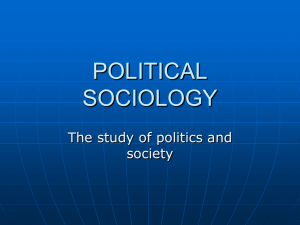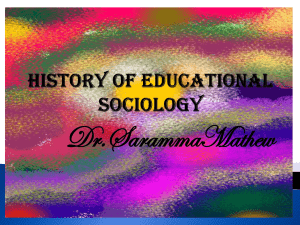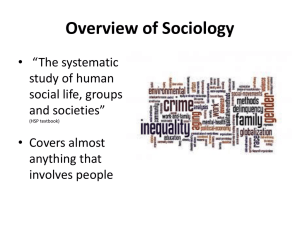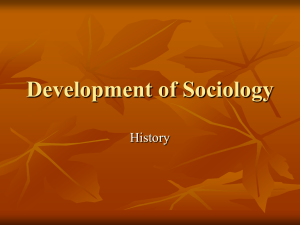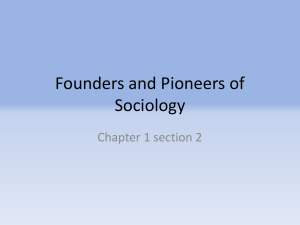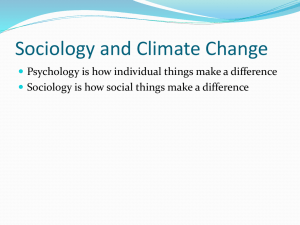Graduate Program in Sociology Instructor: E
advertisement
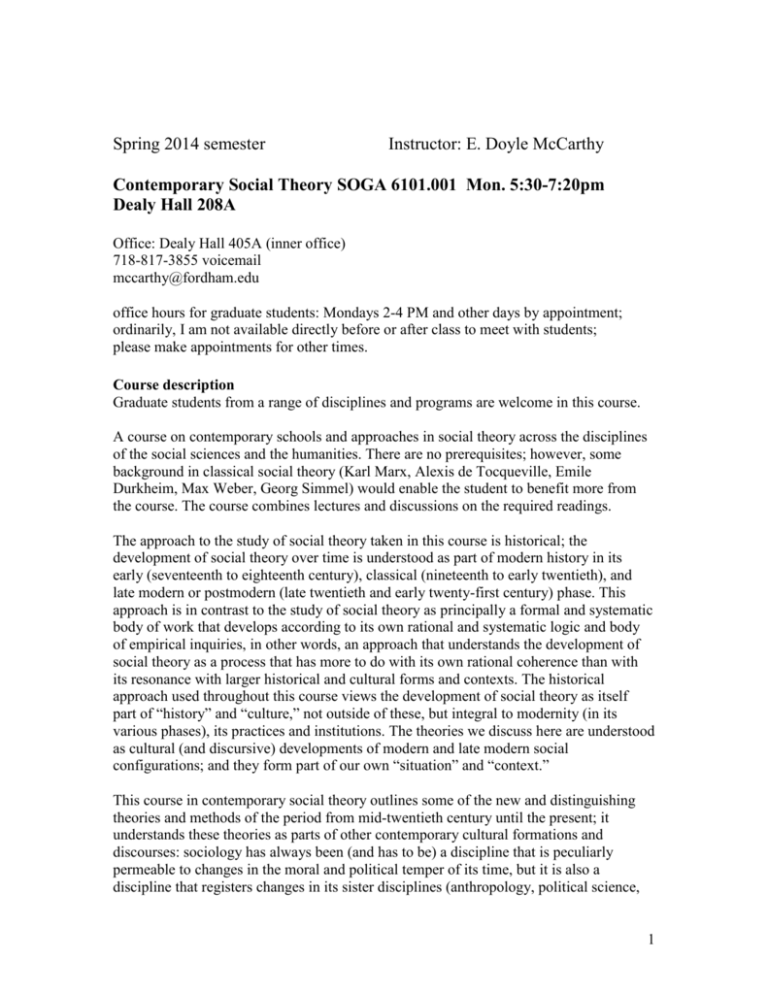
Spring 2014 semester Instructor: E. Doyle McCarthy Contemporary Social Theory SOGA 6101.001 Mon. 5:30-7:20pm Dealy Hall 208A Office: Dealy Hall 405A (inner office) 718-817-3855 voicemail mccarthy@fordham.edu office hours for graduate students: Mondays 2-4 PM and other days by appointment; ordinarily, I am not available directly before or after class to meet with students; please make appointments for other times. Course description Graduate students from a range of disciplines and programs are welcome in this course. A course on contemporary schools and approaches in social theory across the disciplines of the social sciences and the humanities. There are no prerequisites; however, some background in classical social theory (Karl Marx, Alexis de Tocqueville, Emile Durkheim, Max Weber, Georg Simmel) would enable the student to benefit more from the course. The course combines lectures and discussions on the required readings. The approach to the study of social theory taken in this course is historical; the development of social theory over time is understood as part of modern history in its early (seventeenth to eighteenth century), classical (nineteenth to early twentieth), and late modern or postmodern (late twentieth and early twenty-first century) phase. This approach is in contrast to the study of social theory as principally a formal and systematic body of work that develops according to its own rational and systematic logic and body of empirical inquiries, in other words, an approach that understands the development of social theory as a process that has more to do with its own rational coherence than with its resonance with larger historical and cultural forms and contexts. The historical approach used throughout this course views the development of social theory as itself part of “history” and “culture,” not outside of these, but integral to modernity (in its various phases), its practices and institutions. The theories we discuss here are understood as cultural (and discursive) developments of modern and late modern social configurations; and they form part of our own “situation” and “context.” This course in contemporary social theory outlines some of the new and distinguishing theories and methods of the period from mid-twentieth century until the present; it understands these theories as parts of other contemporary cultural formations and discourses: sociology has always been (and has to be) a discipline that is peculiarly permeable to changes in the moral and political temper of its time, but it is also a discipline that registers changes in its sister disciplines (anthropology, political science, 1 history, social philosophy), so changes in these fields will also reverberate in ours (and sociology will direct disciplinary changes in other disciplines as well). Also relevant to these issues of mutual influence and interpenetration of disciplines and discourses is an argument that forms the centerpiece of Anthony Giddens’s “structuration theory,” that sociology and sociological theory bear a special relationship to what we refer to as “social reality,” that our theories and findings have practical consequences, such as when sociological descriptions are converted by social actors into rules of conduct. As Giddens remarked (in The Constitution of Society, 1984 p. 284), “Sociological descriptions have the task of mediating the frames of meaning within which actors orient their conduct.” Or, to use another example, presented by the philosopher Paul Ricoeur (1913-2005): sociology, like psychoanalysis, becomes part of culture by interpreting it, by means of representations provided by its perspectives; both provide their own hermeneutics of culture. (Paul Ricoeur’s “Psychoanalysis and the Movement of Contemporary Culture,” 1974 reprinted in Rabinow & Sullivan, cited below). The overall theme of this course on contemporary social theory is the “cultural turn” in the social sciences since mid-twentieth century, along with the focus on language and culture in the study of social reality, whether in the study of groups, social movements, social organizations, communities, or modern nation-states. The course opens with a discussion of what this new cultural focus has brought to the forefront of sociology and how it differs from earlier theories and methods in the social and human sciences, as well as from earlier presuppositions of the discipline. The course presents—in the form of an historical overview—some of the dominant theoretical fields, topics, and approaches in contemporary social science today, including: cultural sociology and cultural criticism in the work of Raymond Williams, Pierre Bourdieu, and others. sociologies of everyday life and social phenomenology, in the work of Alfred Schutz, Peter Berger, and Thomas Luckmann. feminist social theory and the study of discourse in the work of feminist writers from Simone de Beauvoir to Dorothy Smith, Judith Butler, Patricia Clough, and others. The study of human agency and social interaction in the work of G. H. Mead, Herbert Blumer, Erving Goffman, Harold Garfinkel, R.S. Perinbanayagam, and others. changes in industrial capitalism and theories of capitalism since mid-twentieth century: Immanuel Wallerstein, Stanley Aronowitz, Theda Skocpol, Anthony Giddens, Daniel Bell. 2 studies of globalization, ethnic conflicts, and social movements: and the related themes of nationalisms and social identities in the works of Benedict Anderson, Craig Calhoun, and others. media studies in the works of Stuart Ewen, Douglas Kellner, Todd Gitlin, and others. narrative studies in the works of symbolic interactionists (David Maines), cultural sociologists, and in writers like Ken Plummer, Joseph Davis, and others. new approaches to cultural anthropology and ethnography in the works of many, including James Clifford, George Marcus, John Van Maanen, Loic Wacquant. emotion studies in the writings of sociologists like Arlie Russell Hochschild, Thomas Scheff, Jack Katz, Eva Illouz, and Peter Stearns. studies and theories of risk and the risk society: such as in the theories of Ulrich Beck (1992) and Anthony Giddens (2000). Course Readings: Available at the university bookstore, McGinley Center, and on Amazon.com Books appear in the order we will read them. I have selected them so that several of the topics enumerated above will be represented in the readings. Required readings: 6 books Charles Lemert SOCIAL THEORY: The Multicultural & Classic Readings 5th edition. 2013. Westview Press ISBN 978-0-8133-4668-7 We will use this collection throughout the course as a primary reader. Those who have not studied classical theories can also supplement their readings with some of the readings here from Marx, Weber, and Simmel, and Durkheim. Peter L. Berger & Thomas Luckmann THE SOCIAL CONSTRUCTION OF REALITY: A Treatise in the Sociology of Knowledge. 1966. Garden City NY: Doubleday. ISBN 0-385-05898-5 A work that reflected a change in contemporary social theory from “social realism” to a cultural model, one that problematizes the status of “reality” as something variable and socially formed. The work also renders the world of everyday life as something for social science to theorize and study, opening up ethnographic methods as ways for social science to understand people’s social worlds. 3 Norbert Elias THE CIVILIZING PROCESS: Sociogenetic and Psychogenetic Investigations. Revised edition.[1939] 2000. Basil Blackwell. ISBN 0-631-22160-3 This is considered by many to be an important and, for many years, overlooked classic work of twentieth-century sociology. It stands alone as a masterful work on the longterm transformations of modern Western societies; its analysis is distinct in its ambitious examination over centuries of both changes in human behavior (self-monitoring, selfcontrol and regulation, and the “intimization” of all bodily functions) and changes in social and political organizations. Erving Goffman THE PRESENTATION OF SELF IN EVERYDAY LIFE. 1959. Doubleday/Anchor. ISBN 0-385-09402-7 An early and major work by one of the foremost sociologists of the twentieth century. Goffman introduces here his dramaturgical approach to social life and to the social actors whose everyday lives entail the regular activity of staging performances in social settings. The work concludes with a statement about Goffman’s theory of the social self and its relationship to social encounters. A work that should be included in all collections of sociological studies of the self. Todd Gitlin MEDIA UNLIMITED: How the Torrent of Images and Sounds Overwhelms Our Lives. Revised edition. 2002 and 2007. Henry Holt/ A Metropolitan Owl Book. ISBN 10-0-8050-8689-7 A work by a prominent sociologist about our environments today as driven by mass media and by the speed of its operations and images. The media is portrayed as “an entire way of life” and this book as an attempt to describe the totality of the media phenomenon itself. Loic Wacquant BODY & SOUL: Notes of an Apprentice Boxer. 2004. Oxford. ISBN 13-978-0-19-530562-3 A work by a distinguished sociologist and ethnographer of urban poverty and prisons in the US and Brazil. He is also known as one of the most well-known students of Pierre Bourdieu. This worked has provoked some controversy about its claim to be an “ethnography” and has been heralded by others (like Philip Manning Freud and American Sociology) as an important example of the new genre “autoethnography.” This work brings together two major contemporary themes in sociology, narrative sociology and the new forms of ethnography. Wacquant is currently co-editor of the journal Ethnography and has edited a special issue, “Pierre Bourdieu in the Field” (Vol 5, No. 4 Dec. 2004). Course Requirements Attendance in class is required. There are 15 scheduled class meetings between Monday, January 13 and May 12. Course grades are based on papers and attendance/presentations/discussions. 4 GRADING Students will be graded on their preparation for weekly classes and on participation in discussions and on short papers. There will also be occasions to lead class discussions. 3 papers, each 20 pts.=60 attendance & participation in weekly sessions = 40 total= 100 PAPERS Students select 3 books on which they will write essays (format will be described in class) that raise critical questions about the book and its argument(s). The papers should be focused on a particular topic or theme, but do not select a single chapter or topic that is not central to the entire work. The essays are 3-5 pages long (please keep to this maximum as closely as you can) and refer to specific sections & passages with the (p. ) format. You must use the assigned edition, no exceptions. No reference lists or secondary sources are required for these papers. Please hand the papers in (each time) using a folder; the folder will eventually contain all 3 papers. Papers handed in during the semester will be graded and returned in your folders. The papers can be handed in at any time during the course, but all papers of all students are due in your folders at the class on Monday May 12 (no extensions; late papers will mean that I will submit a grade of INC and that you will have to provide me with the form to sign for this grade). For this reason, I recommend that you do not wait until the end of the course to hand in your 3 papers. WEEKLY SESSIONS Jan 13 Introduction to the course and the readings. Preface & Intro to Lemert Jan 20 No class, university closed Jan 27 Contemporary social theory and the discovery of “culture” Lemert: read the opening sections only of these sections. These readings introduce you to the ways the study of social theory is historically- and culturally-based. 5 Part One Modernity’s Classical Age-Part Five After Modernity 1979-2001 19ff; 143ff; 209ff; 277 ff.; 335ff. Recommended readings: Jeffrey Alexander Part I, Pp. 1-27 in Culture & Society: Contemporary Debates edited by J. Alexander & S. Seidman; Clifford Geertz “Blurred Genres: The Reconfiguration of Social Thought.” Pp. 19-36 in 1983 and 2000. Local Knowledge: Further Essays in Interpretive Anthropology. Also read through the various assigned books to decide which ones you want to use for your 3 papers. Feb 3 Berger & Luckmann Feb 10 Berger & Luckmann conclusion; Norbert Elias introduction Feb 17 no classes Feb 18 TUESDAY class, concluding Elias: reading the 1968 Postscript Feb 24 Erving Goffman: Introduction; recommended readings from Erving Goffman Archives website (URL: http://cdclv.unlv.edu//ega/articles/mccarthy_eg_14.pdf Mar 3 Concluding Goffman Mar 10 Gitlin: Introduction March Spring break 17-21: no class March 24 Concluding Gitlin March 31 Wacquant: Introduction April 7 Wacquant and ethnography April 14 Topic and readings to be assigned from Lemert reader April 17-21 Easter Recess April 21 Easter Monday no class April 28 Topic and Readings to be assigned from Lemert reader May 5 all students hand in all papers: Topics & Readings to be assigned, Lemert reader 6 May 12 Last day of GSAS Monday classes Discussion. Readings to be assigned. The Principal Themes and Issues of Contemporary Sociology and Theory: What have we been reading and learning? A planned critical discussion of all course materials conducted by 3 students. RECOMMENDED SOURCES IN CONTEMPORARY SOCIAL THEORY Bibliographies will be provided for some of the general topics and books covered in class. The following lists of some books and authors I have used in the preparation of this course on social theory today. In many cases, I list only recent works by the authors, those to which I refer in the lectures. Alexander, Jeffrey A. 1990. “Analytic Debates: Understanding the Relative Autonomy of Culture.” Pp. 127 in J. Alexander and S. Seidman eds. Culture and Society. NY: Cambridge. 1987. Twenty Lectures: Social Theory After World War II. Columbia. ________. 2006. The Civil Sphere. Oxford. Jeffrey A. Alexander, Giesen Bernhard, Jason L. Mast. 2006. Social Performance: Symbolic Action, Cultural Pragmatics, & Ritual. Cambridge. Alexander, J. and Steven Seidman. 1990. Culture and Society: Contemporary Debates. New York: Cambridge. Louis Althusser Montesquieu, Rousseau, Marx (1959) ____________. For Marx. (1969) (1969) Anderson, Benedict. 1983/1991. Imagined Communities. Revised and extended edition. New York: Verso. Archer, Margaret S. 1988. Culture and Agency: The Place of Culture in Social Theory. New York: Cambridge University Press. Aries, Phillipe. 1962. Centuries of Childhood: A Social History of Family Life. New York: Vintage Books. Aronowitz, Stanley. 1981. The Crisis in Historical Materialism. Minnesota. ________. 1992. The Politics of Identity: Class, Culture, Social Movements. New York & London: Routledge. Averill, James R. 1980. “A Constructionist View of Emotion.” Pp. 305-39 in R. Plutchik and H. Kellerman (eds.) Theories of Emotion. New York: Basil Blackwell. . 1982. Anger and Aggression. New York: Springer-Verlag. Barbalet, J. M. 1998. Emotion, Social Theory, and Social Structure: A Macrosociological Approach. New York & Cambridge: Cambridge University Press. Barthes, R. [1957] 1972. Mythologies. Translated by A. Lavers. New York: Hill and Wang. Bauman, Zygmunt. 2005. Liquid Life. Polity. Beck, Ulrich. 1992. Risk Society: Towards a New Modernity. London: Sage. 7 Beck, Ulrich & Johannes Willms. 2004. Conversations with Ulrich Beck. Bell, Daniel. 1996. The Cultural Contradictions of Capitalism. Twentieth anniversary edition. Basic Books. Benjamin, Walter. [1955] 1968. Illuminations. Schoecken Books. Berger, Peter L., Brigitte Berger, and Hansfried Kellner. 1973. The Homeless Mind. New York: Random House. Berger, Peter L. and Thomas Luckmann. 1966. The Social Construction of Reality. Garden City, NY: Doubleday. Best, Steven & Douglas Kellner. 1991. Postmodern Theory: Critical Interrogations. NY: Guilford Press. Bloch, Ernst. 1986. The Principle of Hope. 3 vols. Cambridge, MA: MIT Press. Blumer, Herbert. 1969. Symbolic Interactionism. Englewood Cliffs, New Jersey: Prentice Hall. Bonnell, Victoria & Lynn Hunt. 1999. Beyond the Cultural Turn. Univ. California Press. Bourdieu, Pierre. 1977. Outline of a Theory of Practice. Cambridge. ________. [1979] 1984. Distinction: A Social Critique of the Judgment of Taste. Harvard. Pierre Bourdieu & Loic Wacquant. 1992. An Invitation to Reflexive Sociology. Chicago. Butler, Judith. 1990. Gender Trouble. Routledge. Calhoun, Craig. 1997. Nationalism. Minneapolis: University of Minnesota Press. ______. 1994. Social Theory and the Politics of Identity. Blackwell. ______. 1993. “Nationalism and Civil Society…” International Sociology 8(4):387411. Canetti, Elias. 1962. Crowds and Power. New York: Seabury Press. Certeau, Michel de 1984. The Practice of Everyday Life. California. Cerulo, Karen A. 2002. Culture in Mind: Toward A Sociology of Culture & Cognition. Routledge. Clark, Adele E. 2005. Situational Analysis: Grounded Theory After the Postmodern Turn. Sage. Clifford, James. 1988. The Predicament of Culture. Cambridge, Massachusetts: Harvard University Press. Clifford, James & George Marcus. 1986. Writing Culture. California. Clough, Patricia. 1998. The End(s) of Ethnography. 2/e Sage. ________. 1995. Feminist Thought. Blackwell. ________. 2005. AutoAffection. Minnesota. Collins, Randall. 1998. The Sociologies of Philosophies. Harvard. ________. 2004. Interaction Ritual Chains. Princeton. Crane, Diana. 1994. The Sociology of Culture: Emerging Theoretical Perspectives. London: Blackwell. 8 Debeljak Ales. 1998. The Institution of Art and its Historical Forms. Rowman & Littlefield. Debord, Guy. [1967] 1994. The Society of the Spectacle. NY: Zone Books. ________. 1998. Comments on the Society of the Spectacle. London: Verso. Denzin, Norman K. 1984. On Understanding Emotion. San Francisco: Jossey-Bass. ______. 1992. Symbolic Interaction and Cultural Studies. Cambridge, Massachusetts: Blackwell. Dunning, Eric. 1999. Sport Matters: Sociological Studies of Sport, Violence and Civilization. London & New York: Routledge. Elias, Norbert. 1996. The Germans. New York: Columbia University Press. ________. 2000. The Civilizing Process. Blackwell. ________. 1998. The Norbert Elias Reader. Edited by J. Goudsblom & Stephen Mennell, Blackwell. Elias, Norbert and Eric Dunning. 1986. Quest for Excitement. New York: Blackwell. Foucault, Michel. 1977. Language, Counter-Memory, Practice: Selected Essays and Interviews. Edited by D.F. Bouchard. Cornell. ________. 1978. The History of Sexuality Vol. 1, Vintage Books/Random House. ________. 1980. Power/Knowledge: Selected Interviews & Other Writings 1972-1977. edited by Colin Gordon. NY: Pantheon. ________. 1984. Foucault Reader. Edited by Paul Rabinow. NY: Pantheon Books. Friedrichs, Robert W. 1970. A Sociology of Sociology. New York: Free Press. Geertz, Clifford. 1973. The Interpretation of Cultures. Basic Books. ________. 1983. Local Knowledge. Basic Books. ________. 1995. After the Fact. Cambridge, Massachusetts: Harvard University Press. Gergen, Kenneth J. 1985. “The Social Constructionist Movement in Modern Psychology.” The American Psychologist 40(3):266-75. ______. 1991. The Saturated Self. New York: Basic Books. Gergen, Kenneth J. and Keith E. Davis. 1985. The Social Construction of the Person. New York: Springer. Giddens, Anthony. 1971. Capitalism & Modern Social Theory ______. 1990. The Consequences of Modernity. London: Polity. ______. 1991. Modernity and Self-Identity. Stanford University Press. ______. 2000. The Runaway World: How Globalization Is Shaping our Lives. New York: Routledge. Giddens, Anthony & Jonathan Turner. 1987. Social Theory Today. Stanford. Graumann, Carl F. and Kenneth J. Gergen, (eds.). 1996. Historical Dimensions of Psychological Discourse. New York: Cambridge University Press. Gulbenkian Commission. 1996. Open the Social Sciences: Report of the Gulbenkian Commission on the Restructuring of the Social Sciences. Stanford, California: Stanford University Press. Hacking, Ian. 1999. The Social Construction of What? Cambridge & London: Harvard University Press. Hall, Stuart. 1996. Stuart Hall: Critical Dialogues in Cultural Studies. Routledge. Harré, Rom. 1986. The Social Construction of Emotions. London: Basil Blackwell. 9 Harré, Rom, and W. Gerrod Parrott (eds.). 1996. The Emotions: Social Cultural and Biological Dimension. Thousand Oaks, California: Sage Publications. Hobsbawn, Eric. 1994. The Age of Extremes. New York: Vintage. ______. 1990. Nations and Nationalism Since 1780. Cambridge: Canto. Hobsbawn, Eric and Terence Ranger. 1983. The Invention of Tradition. Cambridge. Hochschild, Arlie Russell. 1979. “Emotion Work, Feeling Rules, and Social Structure.” American Journal of Sociology 35:551-73. ______. 1983. The Managed Heart: Commercialization of Human Feeling. Berkeley, California: University of California Press. Hutchinson, J. and A. D. Smith eds. 1994. Nationalism. NY: Oxford. Jameson, Fredric. 1998. The Cultural Turn: Selected Writings on the Postmodern: 1983-1998. Verso. Journal of the Association for the Study of Ethnicity and Nationalism. Nations and Nationalism Vol. 1, Part 1, March 1995. Kellner, Douglas. 1995. Media Culture. Routledge. ________. 2003. Media Spectacle. Routledge. Kracauer, Siegfried. 1995. The Mass Ornament: Weimar Essays. Cambridge: Harvard University Press. Kuhn, Thomas S. 1962/1970. The Structure of Scientific Revolutions. Second Ed. Chicago, Illinois: University of Chicago Press. Lash, Scott. 1999. Another Modernity, A Different Rationality. Blackwell. Lash, Scott and Jonathan Friedman. 1992. Modernity and Identity. Blackwell. Lemert, Charles. 1997. Postmodernism Is Not What You Think. Blackwell. Lévi-Strauss, Claude. [1962] 1969. Totemism. Translated by R. Needham. New York: Penguin. ______. 1966. The Savage Mind. Chicago, Illinois: University of Chicago Press. Luhmann, Niklas. 1982. Love As Passion. Stanford. ________. 1996. The Reality of the Mass Media. Stanford. ________. 1998. Observations on Modernity. Stanford. Lutz, Catherine A. and Lila Abu-Lughod, (eds.). 1990. Language and the Politics of Emotion. New York: Cambridge University Press. Lyotard, Jean-Francois. [1979] 1989. The Postmodern Condition: A Report on Knowledge. Minnesota. ________. 1992. The Postmodern Explained. Minnesota. MacIntyre, Alasdair. 1984. After Virtue: A Study of Moral Theory. 2/e Notre Dame. Marcus, George & Michael M.J. Fischer 1986. Anthropology As Cultural Critique. Chicago. Mead, George Herbert. 1934. Mind, Self, and Society. Chicago, Illinois: University of Chicago Press. Mennell, Stephen. 1989. Norbert Elias: Civilization & the Human Self-Image. Blackwell. 10 Mennell, Stephen and Johan Goudsblom. 1998. The Norbert Elias Reader. Blackwell. Mukerji, C. and M. Schudson. 1991. Rethinking Popular Culture. Berkeley, California: University of California Press. Parker, Andrew, et al. 1992. Nationalisms and Sexualities. New York and London: Routledge. Percy, Walker. 1958. “Symbol, Consciousness, and Intersubjectivity.” Journal of Philosophy 5:631-41. Perinbanayagam, R.S. 1982. The Karmic Theater. Amhurst: University of Massachusetts Press. ______. 1985. Signifying Acts. Carbondale, Illinois: Southern Illinois University Press. ______. 1991. Discursive Acts. Hawthorne, New York: Aldine de Gruyter. ______. 2000. The Presence of Self. Rowman & Littlefield. Peterson, Richard A. 1976. “The Production of Culture: A Prolegomenon.” Pp. 7-22 in R.A. Peterson (ed.) The Production of Culture. Beverly Hills, California: Sage Publications. ______. 1994. “Cultural Studies through the Production Perspective: Progress and Prospects.” Pp. 191-220 in D. Crane (ed.) The Sociology of Culture. Cambridge, Massachusetts: Blackwell. Rabinow, Paul and William Sullivan. 1979. Interpretive Social Science: A Reader. Univ. California Press. _________. 1987. Interpretive Social Sciences: A Second Look. Berkeley: University of California Press. Ritzer, George. 1990. Frontiers of Social Theory: The New Synthesis. Columbia. ________. 2005. Enchanting a Disenchanted World. 2/e Pine Forge Press/Sage. Robertson, Roland. 1992. Globalization: Social Theory and Global Culture. Newbury Park, California: Sage Publications. Robinson, Paul. 1976. The Modernization of Sex: Havelock Ellis, Alfred Kinsey, William Masters, and Virginia Johnson. New York: Harper & Row. Rojek, Chris. 1995. Decentering Leisure: Rethinking Leisure Theory. Thousand Oaks, California: Sage Publications. Rosaldo, Renato. 1993. Culture and Truth. Beacon Press. Said, Edward W. [1978] 1994. Orientalism. 25th anniversary edition. Vintage Books/Random House. ________. 1983. The World, the Text, and the Critic. Cambridge, Massachusetts: Harvard University Press. ________. 2000. The Edward Said Reader edited by Moustafa Bayoumi & Andrew Rubin. Vintage Books/Random House. Sahlins, Marshall. Culture & Practical Reason. (1976) ________. 1985. Islands of History. Chicago, Illinois: University of Chicago Press. Scheff, Thomas J. 1979. Catharsis in Healing, Ritual and Drama. Berkeley, California: University of California Press. ______. 1983. “Towards Integration in the Social Psychology of Emotions.” Annual Review of Sociology 9:333-54. ______. 1990. Microsociology: Discourse, Emotion and Social Structure. Chicago, IL: University of Chicago Press. ______. 1994. Bloody Revenge: Emotions, Nationalism, and War. Boulder, Colorado: Westview Press. 11 Scheler, Max. 1992. On Feeling, Knowing, and Valuing. Ed. H.J. Bershady. Chicago, Illinois: University of Chicago Press. Schweder, R.A. and R.A. Levine. 1984. Culture Theory: Essays on Mind, Self, and Emotions. New York: Cambridge. Seidman, Steven and David G. Wagner. 1992. Postmodernism & Social Theory. Blackwell. Sewell, J. William H. 1999. “The Concept(s) of Culture.” Pp. 35-61 in V.E. Bonnell and L. Hunt, eds. Beyond the Cultural Turn. University of California Press. Shotter, J. and K.J. Gergen. 1989. Texts of Identity. Newbury Park: Sage Publications. Skinner, Quentin. 1985. The Return of Grand Theory in the Human Sciences. Cambridge. Smith, Dorothy E. 1987. The Everyday World As Problematic: A Feminist Sociology. Northeastern Univ. Press & Toronto. ________. 1990. The Conceptual Practices of Power: A Feminist Sociology of Knowledge. Northeastern Univ. Press. ________. 1999. Writing the Social. Toronto. Swaan, Abram de. 1990. The Management of Normality: Critical Essays in Health and Welfare. New York: Routledge. Taylor, Charles. 1989. Sources of the Self: The Making of the Modern Identity. Cambridge, Massachusetts: Harvard University Press. ________. 2004. Modern Social Imaginaries. Duke. Thoits, Peggy A. 1985. “Self labeling processes in mental illness: The role of emotional deviance.” American Journal of Sociology 92:221-49. __________. 1989. “The Sociology of Emotions.” Annual Review of Sociology 15:317-342. __________. 1996. “Managing the Emotions of Others.” Symbolic Interaction 19(2):85-109. Wagner, Roy. 1981. The Invention of Culture. Revised and expanded edition. Chicago, Illinois: University of Chicago Press. Wallerstein, Immanuel. 1991. Geopolitics and Geoculture: Essays in a Changing World-System. Cambridge. ________. 1995. After Liberalism. NY: New Press. ________. 2000. The Essential Wallerstein. NY: New Press. White, Hayden. 1973. Metahistory: The Historical Imagination in Nineteenth-Century Europe. Johns Hopkins. Wiley, Norbert. 1994. The Semiotic Self. Chicago. ________. “The History & Politics of Recent Sociological Theory,” Pp. 392-415 in George Ritzer Frontiers of Social Theory: The New Synthesis. Columbia. Williams, R. 1961. The Long Revolution. Revised edition. Harper & Row. ________. 1973. The Country and the City. Oxford. ________. 1974. Television: Technology & Cultural Form. Schoecken Books. ________. 1977. Marxism and Literature. Oxford. ________. [1958] 1983 Culture and Society: 1780-1950. Columbia University Press. ________. 1981. The Sociology of Culture. New York: Schocken. 12 ________. 1983 Keywords: A Vocabulary of Culture & Society. Wuthnow, Robert. 1987. Meaning and Moral Order: Explorations in Cultural Analysis. Berkeley: University of California Press. 13



